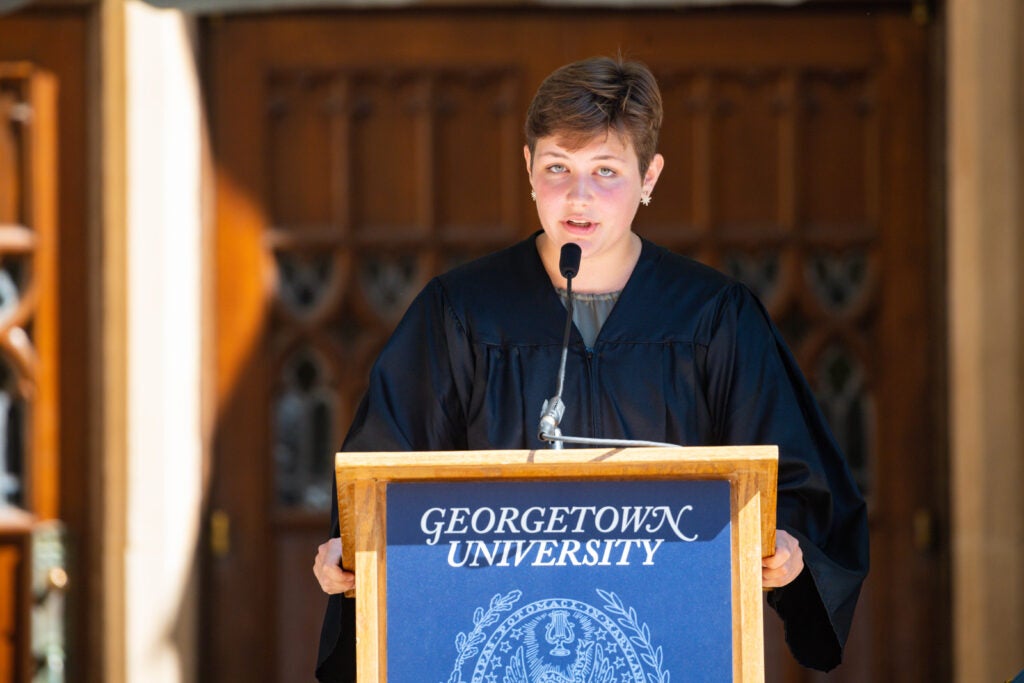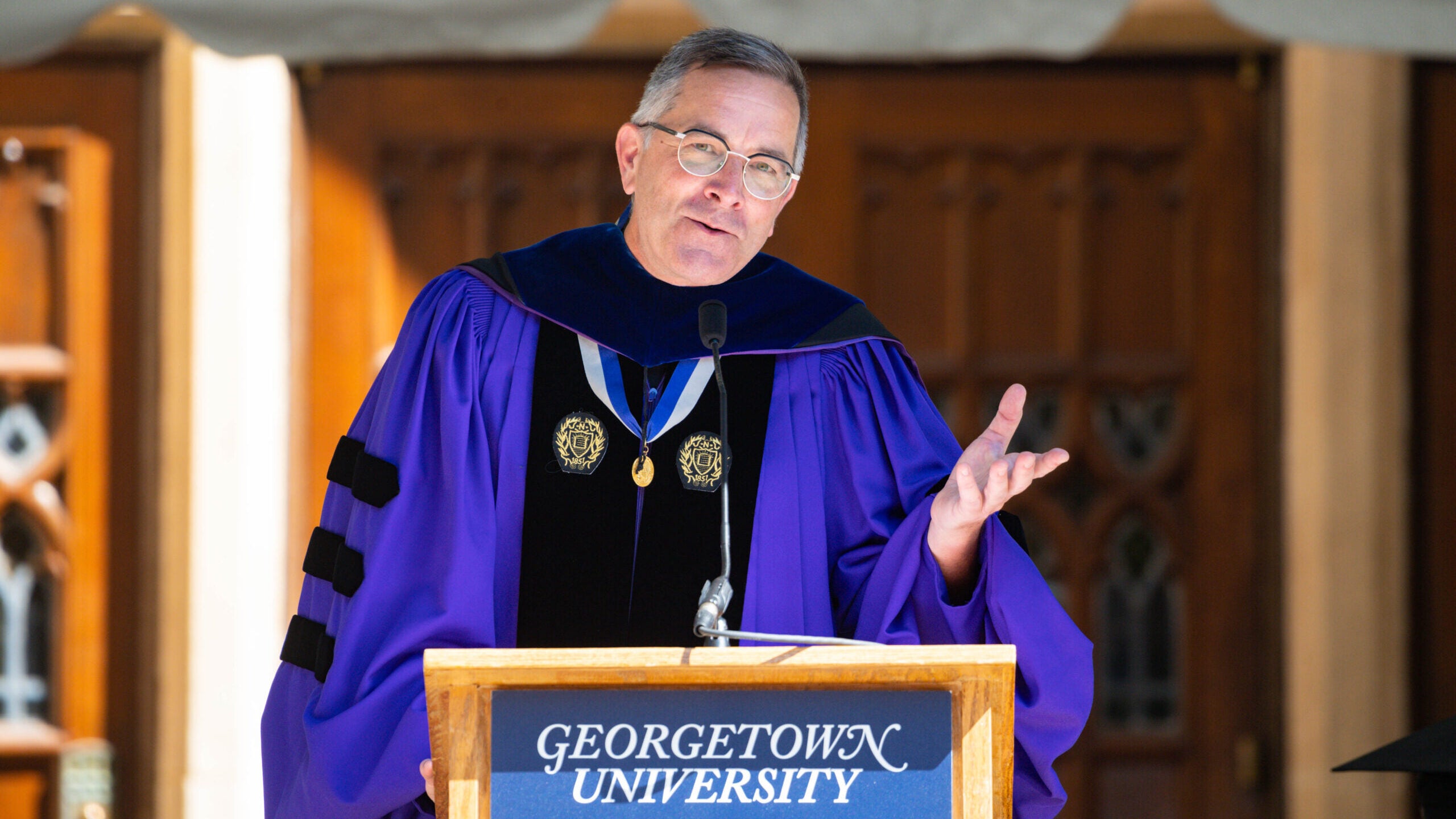College Speakers Address Class of 2026 at Fall Convocation
As August winds to a close, the Hilltop has been abuzz with all the commiserate activity that comes with the starting of a new academic year. Before faculty handed out syllabi and unboxed fresh chalk, first-year students from each of the university’s five undergraduate schools gathered on the front lawn to partake in the New Student Convocation.
Students were greeted by faculty, staff and alumni as they received the same robes they will wear at graduation and officially entered into the school’s community.
In his welcoming remarks, Provost Robert M. Groves acknowledged the immense trust that the families and caregivers of the assembled students were placing in Georgetown.
“We acknowledge the responsibilities you are giving us to educate the mind and spirit of your child,” Groves said. “To have them experience the intense excitement of original discovery, to help them tackle the deep ethical and religious questions that each of us must resolve for ourselves and, finally, to help each of them discern how they can make this a better world.”
To the gathered students, Groves not only extended his welcome, but encouraged each and every attendee to take agency over their own education.
“What you get out of Georgetown depends on how you take advantage of its resources. An education is not given to you, you achieve it through your own efforts,” Groves said. “By donning your graduation robes, we signify that you are becoming full citizens of our community. You have all the rights that the community offers, but also all the responsibilities to make it work as a collectivity.”
Faculty and Student Remarks

Charlotte Messaris (C’24) addresses the Class of 2026.
This year, two members of the Georgetown College of Arts & Sciences addressed the assembled students – Rev. David Collins, S.J., and Charlotte Messaris (C’24).
Messaris, a junior majoring in French and linguistics, spoke to the Class of 2026 as the recipient of the Thomas P. McTighe Prize, named for a distinguished professor of philosophy who taught at the University for more than 40 years. Messaris is a notable member of her class, both a member of the prestigious Bakers Scholar Program and an alumna of the Faculty of Language and Linguistics Hager Scholars Program.
To prepare the assembled students for their first year, Messaris likened her own experience to that of a student in an intensive language class.
“You are bombarded with newness as you incorporate sets of unexplored vocabulary and study a culture different from your own,” Messaris said. “Your first year at Georgetown can feel similarly overwhelming when navigating a new campus and a diverse array of courses, student activities, core values and, might I say, amazing acronyms.”
Messaris encouraged the Class of 2026 to dive head first into their classes and community.
“As one does when learning a new language, fearlessly immerse yourself. Discerning your path is a daunting and messy process so I encourage you to lean into what excites you,” Messaris said. “Unabashedly chase joy and be patient with yourself. Take the class that piques your curiosity and fascinates you enough to call your mom and sign up for the club that catches your attention. Let your passions be your guide and know that you can count on your Georgetown community whenever you need a hand.”
Messaris was careful to note that every individual student contributes to what makes the university great.
“There is space for everyone here and Georgetown needs each and every one of us,” Messaris said. “Through all of our unique and wonderful contributions we together make Georgetown what it is – a university of excellence and integrity.”
Collins, the Director of the Catholic Studies Program and an Associate Professor in the Department of History, addressed the students from the perspective of a faculty member
Drawing on the Parable of the Good Samaritan, Collins encouraged the students to “not rush” in their time at Georgetown.
In Jesus’s parable of the good Samaritan, a group of bandits attack a traveler on the road and leave him for dead. A priest passes by the victim, but because he has religious services that demand his attention, he continues on the road. Next, a scholar passes, but due to his teaching duties he can’t stop. Finally, a Samaritan passes, notices the victim of the attack, and stops to tend to him. Then, he recruits others to provide care and makes a promise to stop again on his way back.
“The lesson’s linchpin is that the Samaritan and the crime victim were different – religiously, tribally, ethnically – different,” Collins explained. “Their rivalrous identities were supposed to make them hostile to each other, yet in the parable, the Samaritan saw someone in need and acted not on what divided them, but what united them – a shared humanity.”
By not rushing, the Samaritan saw the shared humanity, which the priest and the scholar ignored. For first-year students, there are seemingly innumerable demands on their time, acknowledged Collins, including making friends, joining clubs, declaring a major and attaining an internship.
“The danger of rushing is not, after four years, that you have accomplished nothing,” Collins explained. “Rather, the question is, by rushing, what might you miss?”
Collins expressed his hope that the students would develop the ability to think deeply while at Georgetown.
“Thinking of the kind that notices the truly urgent, that labors to expose its complex causes, that struggles to develop insights and solutions that last,” Collins explained. “Thinking that learns to distinguish the essential from the important and to draw the doable out of the desirable.
This type of deep thinking, Collins told the assembled students, was essential to becoming women and men for others.
“Let’s not rush, let’s slow down, let’s think deeply and, like the Samaritan, let’s act humanely.”
-by Hayden Frye (C’17)
